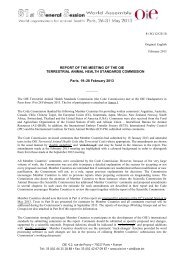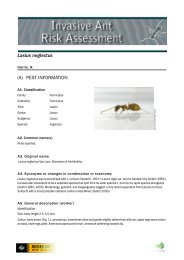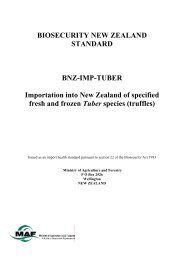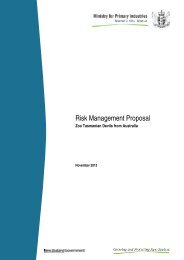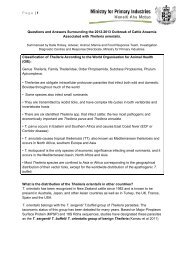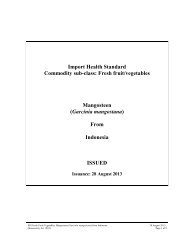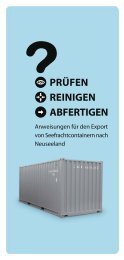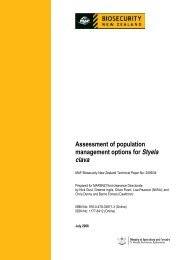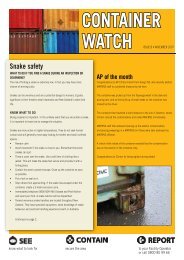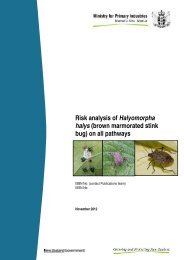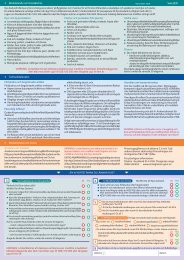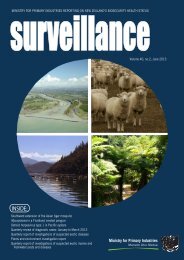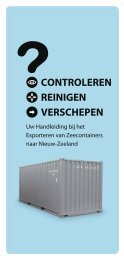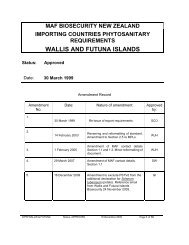Import risk analysis: Llamas (Lama glama) and alpacas (Vicugna ...
Import risk analysis: Llamas (Lama glama) and alpacas (Vicugna ...
Import risk analysis: Llamas (Lama glama) and alpacas (Vicugna ...
Create successful ePaper yourself
Turn your PDF publications into a flip-book with our unique Google optimized e-Paper software.
21. Brucella spp.<br />
21.1. HAZARD IDENTIFICATION<br />
21.1.1. Aetiological agent<br />
Brucella abortus, Brucella melitensis, Brucella suis, <strong>and</strong> Brucella ovis.<br />
21.1.2. OIE list<br />
Bovine (B. abortus), porcine (B. suis) <strong>and</strong> sheep <strong>and</strong> goat (B. ovis <strong>and</strong> B. melitensis)<br />
brucellosis are listed.<br />
21.1.3. New Zeal<strong>and</strong> status<br />
B. abortus was eradicated from New Zeal<strong>and</strong> by 1989 (Hellstrom 1991; Mackereth 2003).<br />
B. melitensis <strong>and</strong> B. suis are not present. B. abortus, B. melitensis <strong>and</strong> B. suis are unwanted,<br />
notifiable organisms (MAF 2009). B. ovis is endemic.<br />
21.1.4. Epidemiology<br />
Information on the global occurrence of Brucella species <strong>and</strong> brucellosis is available from<br />
the World Animal Health Information Database (OIE 2009). Bovine brucellosis formerly<br />
had a world-wide distribution but has now been eradicated from many developed<br />
countries. Canada <strong>and</strong> Australia are free from the disease. It still occurs, but at a low<br />
prevalence, in the USA <strong>and</strong> in some parts of the EU, Central <strong>and</strong> South America <strong>and</strong> Asia.<br />
B. melitensis affects goats primarily but also sheep <strong>and</strong> occurs in some countries in Europe<br />
<strong>and</strong> South <strong>and</strong> Central America but not in Australia, the USA or Canada. B. suis occurs in<br />
some European, Asian, South <strong>and</strong> Central American countries <strong>and</strong> at a low prevalence in<br />
the USA. The last occurrence of B. suis in Australia was reported in 2004. The UK is free<br />
from all Brucella spp.<br />
Brucellosis is a rare disease of camelids. Fowler (1998) reviewed a report in which an<br />
outbreak caused by B. melitensis is described. He also reviewed a paper describing the<br />
death of three llamas after exposure to camels recently imported from Russia. These<br />
animals had high antibody titres to Brucella. However, this report must be viewed with<br />
some scepticism since brucellosis never causes acute fatal infections in adults of other<br />
animal species. Nevertheless, Nielson (2008) reports brucellosis in camelids related to<br />
contact with large <strong>and</strong> small ruminants infected with B. abortus or B. melitensis. <strong>Llamas</strong><br />
have been experimentally infected with B. abortus. The only pregnant llama in the exposed<br />
group aborted <strong>and</strong> the organism could be isolated from the placenta, foetus <strong>and</strong> various<br />
organs in the dam (Gidlewski et al 2000). Antibody was detected in llamas experimentally<br />
exposed to B. abortus S19 (vaccine strain) <strong>and</strong> strain 2308 (Gilsdorf et al 2001). Exposed<br />
camelids developed antibody that was detectable by a range of conventional serological<br />
tests (Gilsdorf et al 2001; Rojas et al 2004) but difficulties were experienced when using<br />
the complement fixation test due to anticomplementary activity of the sera (Rojas et al<br />
2004).<br />
No evidence was found of natural infection of camelids with B. suis, but since this<br />
organism is closely related to other Brucella spp. (B. abortus <strong>and</strong> B. melitensis) it is likely<br />
that it could be infectious for camelids. It is unlikely that B. ovis would be infectious for<br />
MAF Biosecurity New Zeal<strong>and</strong> <strong>Import</strong> <strong>risk</strong> <strong>analysis</strong>: <strong>Llamas</strong> <strong>and</strong> <strong>alpacas</strong> from specified countries ● 73



